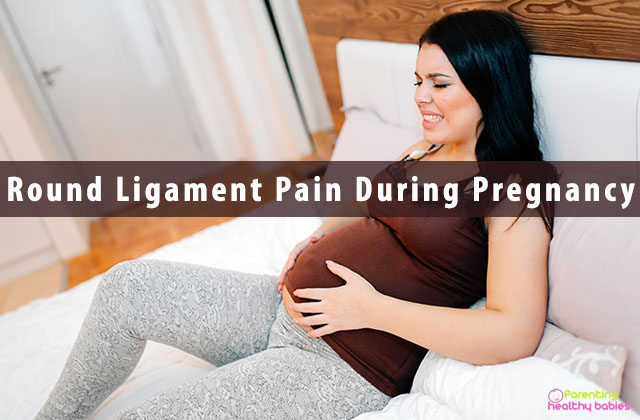Round ligament pain is pretty common during pregnancy. It can be defined as a sharp pain occurring on either one or both sides of the abdomen. It is likely to be noticeable during the second trimester.
There are two round ligaments in the pelvis, one on each side of the uterus. The round ligaments stretch and thicken as the uterus grows during the pregnancy. This is what further leads to the spasm like pain which is however harmless but uncomfortable.
The pain can be felt as a sharp one when you suddenly change your position or suddenly get out of the bed or a chair. You are also likely to feel the pain when you cough or after an active day or some physical activity. The pain occurs internally, but you can trace it on your skin on a high cut swim suit, and you will see that it would follow the bikini line. The article consists of the causes, symptoms and treatment of round ligament pain during pregnancy. Read below to find more:
Guide for Round Ligament Pain in Pregnancy
Causes
Your womb (uterus) is supported by several ligaments as it grows during pregnancy. One of these is called as the round ligament, which connects the front part of the womb to the groin (area where the legs attack to the pelvis). The round ligament stretches when the baby and womb grow, which further makes it to become strained. Apart from this, sudden movements like a rubber band snapping can also cause the ligament to tighten, which causes a sudden jabbing feeling.
Symptoms
Round ligament pain can be a lot uncomfortable sometimes. But at the same time, it is perfectly normal at the time of pregnancy because of the changes in the body.
A sharp and sudden spasm in the belly are the most commonly associated symptoms of round ligament pain. This can happen on either of the sides and you are likely to feel the pain more on one of the sides as compared to the other one. also, rapid movements and exercise may lead to the pain, for instance –
- Coughing
- Laughing
- Sneezing
- Rolling over in bed
- Getting up too quickly
Treatment
There are certain tips that can be followed in order to reduce the discomfort and pain. These are as given below:
Rest – As and when the pains strikes, sit and try to relax and calm yourself down. You should rest comfortably and this will definitely ease your pain.
Change positions – lie on either of the side and keep a pillow under your belly for the support. Keep another pillow between your legs.
Apply warmth – you can gently massage the area using your fingertips.
Maternity support garment – wearing a maternity belt can bring a lot of relief to the painful area. this can also ease the low back pain and pelvic pressure by providing gentle support to your belly.
Mild pain reliever – you can ask your health care provider if you can take acetaminophen in case the pain interferes with your day to day activities.
Slow down – in case the pain occurs whenever you are physically active, it is better to slow down to see if that works and when you feel better, continue with your activity but at a slower pace.
Posture – it is imperatively important for you to practice good body mechanics. Try to keep your back straight and shoulders back. Highly avoid any of those movements that can make the pain worse.
Remember, you should avoid positions that may make the condition worse.
When to call the health care provider?
If the abdominal pain during pregnancy continues even after a short rest, it is recommended you call your doctor. You should tell your doctor about any other pain you have during pregnancy. Also, you can contact your health care provider in case the pain is accompanied by the following:
- Severe pain or cramps
- More than three-four contractions within 60 minutes, even if they don’t hurt or a contraction that doesn’t end.
- Vaginal bleeding or spotting. Change in the amount or type of vaginal discharge.
- Fever, faintness, chills, nausea or vomiting
- Pain or burning sensation when you urinate.
- Lower back pain
- Or an increase in pressure in the pelvic area
There can be different causes of belly pain at the time of pregnancy. Your doctor may also look forward to more serious conditions including pregnancy complications. Placenta abruptions or non-pregnancy illnesses including the following are some of these
- Inguinal hernia
- Appendicitis
- Stomach, kidney and liver problems
